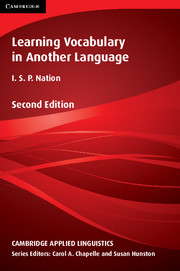Book contents
- Frontmatter
- Contents
- Series editors' preface
- Acknowledgements
- Introduction
- 1 The goals of vocabulary learning
- 2 Knowing a word
- 3 Teaching and explaining vocabulary
- 4 Vocabulary and listening and speaking
- 5 Vocabulary and reading and writing
- 6 Specialised uses of vocabulary
- 7 Vocabulary-learning strategies
- 8 Learning words from context
- 9 Word parts
- 10 Using dictionaries
- 11 Deliberate learning from word cards
- 12 Finding and learning multiword units
- 13 Testing vocabulary knowledge and use
- 14 Designing the vocabulary component of a language course
- Appendices
- Subject index
- Author index
- Frontmatter
- Contents
- Series editors' preface
- Acknowledgements
- Introduction
- 1 The goals of vocabulary learning
- 2 Knowing a word
- 3 Teaching and explaining vocabulary
- 4 Vocabulary and listening and speaking
- 5 Vocabulary and reading and writing
- 6 Specialised uses of vocabulary
- 7 Vocabulary-learning strategies
- 8 Learning words from context
- 9 Word parts
- 10 Using dictionaries
- 11 Deliberate learning from word cards
- 12 Finding and learning multiword units
- 13 Testing vocabulary knowledge and use
- 14 Designing the vocabulary component of a language course
- Appendices
- Subject index
- Author index
Summary
Most of the content words of English can change their form by adding prefixes or suffixes. These affixes are typically divided into two types – inflectional and derivational. The inflectional affixes in English are all suffixes. They include -s (plural), -ed, -ing, -s (3rd person singular), -s (possessive), -er (comparative), -est (superlative). Unlike most derivational suffixes, inflections do not change the part of speech of the word or word group they are attached to, and are added after a derivational suffix if the word has one.
Derivational affixes in English include prefixes and suffixes. Most of the derivational suffixes and a few prefixes change the part of speech of the word they are added to – for example, happy (adjective)/happiness (noun); able (adjective)/enable (verb). Some of the affixes, especially preixes, also alter the meaning of the word in a substantial way – for example, judge/prejudge; happy/unhappy; care/careless. Words which contain affixes are sometimes called complex words.
There are two kinds of word stems, those which can stand as a word in their own right – help/helpless – and are called free forms, and those which cannot stand as a word in their own right without an affix (bound forms) -clude as in preclude, include. In general, bound stems are best learned as mnemonic items for particular words, that is, if you know that -clude means ‘close’ this may help you remember the meaning of exclude and perhaps include.
- Type
- Chapter
- Information
- Learning Vocabulary in Another Language , pp. 389 - 413Publisher: Cambridge University PressPrint publication year: 2013

